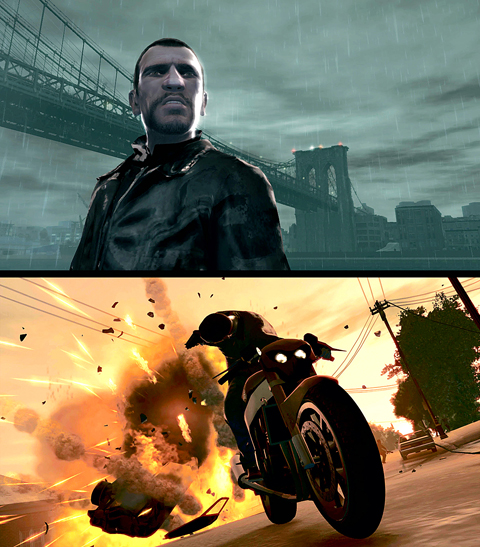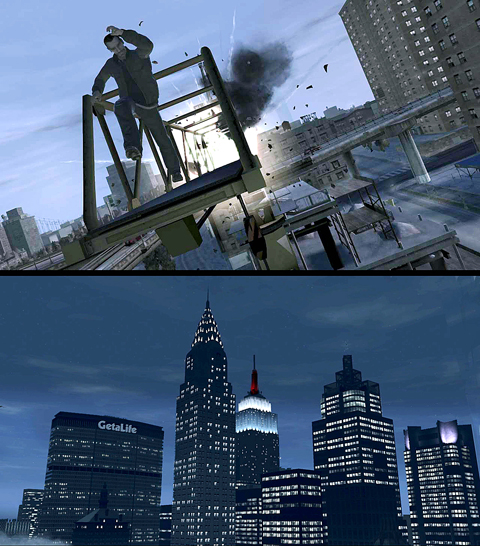I was rolling through the neon deluge of a place very like Times Square the other night in my Landstalker sport utility vehicle, listening to David Bowie’s Fascination on the radio. The glittery urban landscape was almost enough to make me forget about the warehouse of cocaine dealers I was headed uptown to rip off.
Soon I would get bored, though, and carjack a luxury sedan. I’d meet my Rasta buddy Little Jacob, then check out a late show by Ricky Gervais at a comedy club around the corner. Afterward I’d head north to confront the dealers, at least if I could elude the cops. I heard their sirens before I saw them and peeled out, tires squealing.
It was just another night on the streets of Liberty City, the exhilarating, lusciously dystopian rendition of New York City in 2008 that propels Grand Theft Auto IV, the ambitious new video game that was released yesterday for the Xbox 360 and PlayStation 3 systems.

PHOTOS: NY TIMES NEWS SERVICE
Published by Rockstar Games, Grand Theft Auto IV is a violent, intelligent, profane, endearing, obnoxious, sly, richly textured and thoroughly compelling work of cultural satire disguised as fun. It calls to mind a rollicking R-rated version of Mad magazine featuring Dave Chappelle and Quentin Tarantino, and sets a new standard for what is possible in interactive arts. It is by far the best game of the series, which made its debut in 1997 and has since sold more than 70 million copies.
Niko Bellic is the player-controlled protagonist this time, and he is one of the most fully realized characters video games have yet produced. A veteran of the Balkan wars and a former human trafficker in the Adriatic, he arrives in Liberty City’s rendition of Brighton Beach at the start of the game to move in with his affable if naive cousin Roman. Niko expects to find fortune and, just maybe, track down someone who betrayed him long ago. Over the course of the story line he discovers that revenge is not always what one expects.
Besides the nuanced Niko the game is populated by a winsome procession of grifters, hustlers, drug peddlers and other gloriously unrepentant lowlifes, each a caricature less politically correct than the last.

PHOTOS: NY TIMES NEWS SERVICE
Hardly a demographic escapes skewering. In addition to various Italian and Irish crime families, there are venal Russian gangsters, black crack slingers, argyle-sporting Jamaican potheads, Puerto Rican hoodlums, a corrupt police commissioner, a steroid-addled Brooklyn knucklehead named Brucie Kibbutz and a former Eastern European soldier who has become a twee Upper West Side metrosexual.
Breathing life into Niko and the other characters is a pungent script by Dan Houser and Rupert Humphries that reveals a mastery of street patois to rival Elmore Leonard’s. The point of the main plot is to guide Niko through the city’s criminal underworld. Gang leaders and thugs set missions for him to complete, and his success moves the story along toward a conclusion that seems as dark as its beginning. But the real star of the game is the city itself. It looks like New York. It sounds like New York. It feels like New York. Liberty City has been so meticulously created it almost even smells like New York. From Brooklyn (called Broker), through Queens (Dukes), the Bronx (Bohan), Manhattan (Algonquin) and an urban slice of New Jersey (Alderney), the game’s streets and alleys ooze a stylized yet unmistakable authenticity. (Staten Island is left out, however.)
The game does not try to represent anything close to every street in the city, but the overall proportions, textures, geography, sights and sounds are spot-on. The major landmarks are present, often rendered in surprising detail, from the Cyclone at Coney Island to the Domino Sugar factory and Grand Army Plaza in Brooklyn and on up through the detritus of the 1964 to 1965 World’s Fair in Queens. Central Park, the Empire State Building, various museums, the Statue of Liberty and Times Square are all present and accounted for. There is no Yankee Stadium, but there is a professional baseball team known, with the deliciousness typical of the game’s winks and nods, as the Swingers.
At least as impressive as the city’s virtual topography is the range of the game’s audio and music production, delivered through an entire dial’s worth of radio stations available in almost any of the dozens of different cars, trucks and motorcycles a player can steal. From the jazz channel (billed as “music from when America was cool”) through the salsa, alt-rock, jazz, metal and multiple reggae and hip-hop stations, Lazlow Jones, Ivan Pavlovich and the rest of Rockstar’s audio team demonstrate a musical erudition beyond anything heard before in a video game. The biggest problem with the game’s extensive subway system is that there’s no music underground. (Too bad there are no iPods to nab.)
The game’s roster of radio hosts runs from Karl Lagerfeld to Iggy Pop and DJ Green Lantern. It is not faint praise to point out that at times, simply driving around the city listening to the radio — seguing from Moanin’ by Art Blakey and the Jazz Messengers to the Isley Brothers’ Footsteps in the Dark to The Crack House by Fat Joe featuring Lil Wayne — can be as enjoyable as anything the game has to offer.

The Democratic Progressive Party (DPP), Chinese Nationalist Party (KMT), and the country’s other political groups dare not offend religious groups, says Chen Lih-ming (陳立民), founder of the Taiwan Anti-Religion Alliance (台灣反宗教者聯盟). “It’s the same in other democracies, of course, but because political struggles in Taiwan are extraordinarily fierce, you’ll see candidates visiting several temples each day ahead of elections. That adds impetus to religion here,” says the retired college lecturer. In Japan’s most recent election, the Liberal Democratic Party lost many votes because of its ties to the Unification Church (“the Moonies”). Chen contrasts the progress made by anti-religion movements in

Last week the State Department made several small changes to its Web information on Taiwan. First, it removed a statement saying that the US “does not support Taiwan independence.” The current statement now reads: “We oppose any unilateral changes to the status quo from either side. We expect cross-strait differences to be resolved by peaceful means, free from coercion, in a manner acceptable to the people on both sides of the Strait.” In 2022 the administration of Joe Biden also removed that verbiage, but after a month of pressure from the People’s Republic of China (PRC), reinstated it. The American

Chinese Nationalist Party (KMT) legislative caucus convener Fu Kun-chi (傅?萁) and some in the deep blue camp seem determined to ensure many of the recall campaigns against their lawmakers succeed. Widely known as the “King of Hualien,” Fu also appears to have become the king of the KMT. In theory, Legislative Speaker Han Kuo-yu (韓國瑜) outranks him, but Han is supposed to be even-handed in negotiations between party caucuses — the Democratic Progressive Party (DPP) says he is not — and Fu has been outright ignoring Han. Party Chairman Eric Chu (朱立倫) isn’t taking the lead on anything while Fu

Feb 24 to March 2 It’s said that the entire nation came to a standstill every time The Scholar Swordsman (雲州大儒俠) appeared on television. Children skipped school, farmers left the fields and workers went home to watch their hero Shih Yen-wen (史艷文) rid the world of evil in the 30-minute daily glove puppetry show. Even those who didn’t speak Hoklo (commonly known as Taiwanese) were hooked. Running from March 2, 1970 until the government banned it in 1974, the show made Shih a household name and breathed new life into the faltering traditional puppetry industry. It wasn’t the first